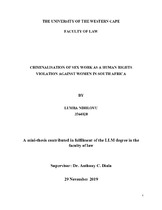Criminalisation of sex work as a human rights violation against women in South Africa
Abstract
There is considerable and often emotive debate around the topic of sex work. Sex work is either
criminalised, decriminalised, or legalised depending on the country. In South Africa, sex work is
criminalised in section 20 (1) (Aa) of the Sexual Offences Act (previously Immorality Act) 23 of
1957. This dissertation asks whether the criminalisation of sex work is a human rights violation
by investigating how it negatively affects the human rights of female sex workers. It focusses on
the disadvantages of criminalising sex work and the effectiveness of South Africa’s legislative
framework on sex work. It analyses the criminalisation of sex work in South Africa in the
context of gender inequality, constitutional texts, policy documents, and South Africa’s
commitment to international human rights instruments.
This dissertation uses a qualitative method involving literature review and content
analyses of case law and legislation. It reveals a relationship between the criminalisation of sex
work and the violation of sex workers’ human rights. It further finds that criminalisation of sex
work contributes to women’s human rights violations. Due to fear of criminal prosecution,
criminalisation hinders female sex workers from accessing justice and healthcare services.
The dissertation recommends reform of South Africa’s legal framework to give effect to
the objectives of the Bill of Rights and international human rights treaties. Specifically, section
20(1) (Aa) of the Sexual Offences Act 23 of 1957 should be repealed, and legislation should be
adopted to enable sex workers enjoy the full protection of the law.

